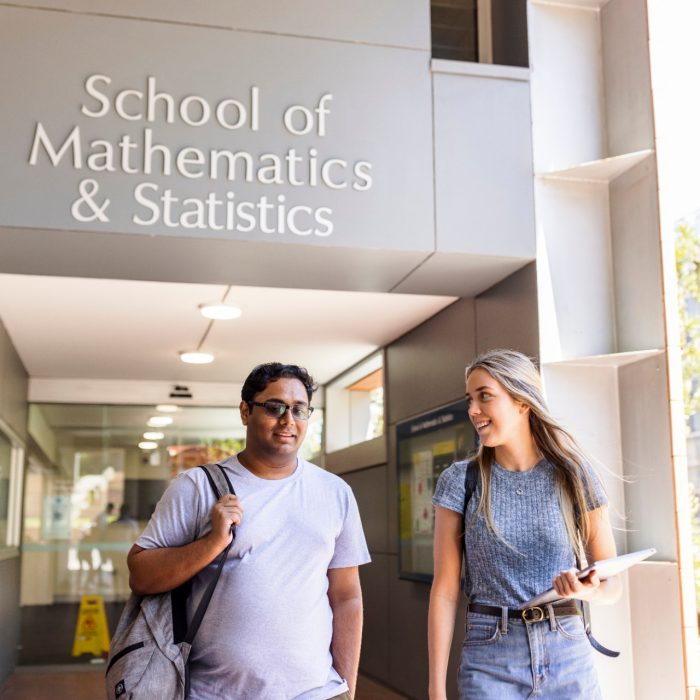Departments

The School of Mathematics and Statistics engages in a range of areas from applied and algorithmic problems to the study of fundamental mathematical questions and statistical analysis. Our research is multi-disciplinary and has earned international recognition. We also attract a high level of funding. Our students study in a lively environment and are prepared for a variety of careers through our industry connections, research, education and scholarships. Discover more about our departments.
Department of Applied Mathematics
The Department of Applied Mathematics at UNSW is one of the largest and most successful in Australia. It is an active centre for research, both fundamental and applied.
The research areas of the department currently comprise biomathematics; computational mathematics; dynamical systems; fluid dynamics, oceanic and atmospheric sciences; and optimisation.
Staff members work on a wide range of research projects in applied mathematics and participate in collaborative research activities with leading international researchers. The national and international standing of the department in its chosen areas of research has been maintained by a distinguished publication record, with hundreds of peer-reviewed research papers appearing over the last several years. Department members have received prestigious awards and international recognition for outstanding research in recent years.
The Department of Applied Mathematics provides a vigorous postgraduate program and has a substantial enrolment of high-quality postgraduate students. Please see Studying applied mathematics at UNSW for more information on undergraduate and postgraduate study.
The UNSW Climate Change Research Centre (CCRC) is a centre which evolved out of the School of Mathematics and Statistics, with members from the Department of Applied Mathematics. It became an independent centre within the Faculty of Science in October 2008, but continues to collaborate closely with the School.
The department also has close links with, and is a heavy user of, regional (Intersect) and national (National Computational Infrastructure) centres for high performance computing, as well as the School's own high performance computing resources.
Please see Seminars for upcoming applied seminars.
Department of Pure Mathematics
The Department of Pure Mathematics at UNSW is one of the strongest and most successful in Australia. Research interests of pure staff members span a wide spectrum of pure mathematics, from harmonic and functional analysis, through to algebra and discrete mathematics, with applications in areas such as physics and computer science.
The research areas of the department comprise algebra; combinatorics; functional and harmonic analysis; geometry and mathematical physics; and number theory.
There are strong research links with the School's other departments; for example the Nonlinear Phenomena Group spans both applied and pure, while the Combinatorics Group includes members from statistics.
Pure mathematics is concerned with fundamental mathematical structures and studies them for their own sake. Researchers may be driven by the beauty of the problem or the difficulty of the solution. Mathematics that is considered to be 'pure' can later turn out to have unexpected applications. Finance, computer science and cryptography are all areas where pure mathematics is now of vital importance.
The department has an active seminar program. Details can be found on our Seminars page.
The Department of Pure Mathematics provides a vigorous postgraduate program and has a substantial enrolment of high quality postgraduate students. Please see Studying pure mathematics at UNSW for more information on undergraduate and postgraduate study.
Department of Statistics
The Department of Statistics at UNSW is one of the most dynamic in Australia. It provides expertise in a wide range of activities including, research, teaching, consulting and the organisation of technical workshops.
The research areas of the department comprise Bayesian and Monte Carlo methods; biostatistics and ecology; finance and risk analysis; nonparametric statistics; and stochastic analysis. Research undertaken by staff members has resulted in an extensive publication record.
Seminars run by members of the department and their visitors are held on a regular basis.
Taught undergraduate degrees and a range of Masters courses are available, some with scholarship support, designed to take advantage of the demands of the modern statistical workplace. We have a Statistics Walk-In Consultation Service (currently suspended due to COVID-19) which aims to support undergraduate students in some of our most popular statistics courses.
Short courses are run regularly by Stats Central, which also offers statistical consultations for UNSW staff and students regarding all aspects of a research project (study design, analysis and communication). Study design advice is free for all UNSW researchers and all consulting services are free for UNSW higher degree research students.
The Statistics Department's broad range of research interests support a variety of options for postgraduate and postdoctoral research. Graduates with a UNSW degree in statistics can be assured of a highly portable and valued skill set for their chosen profession. Please see Studying statistics at UNSW for more information regarding undergraduate and postgraduate study.
The Department of Statistics at UNSW is a world-class centre of teaching and research, with a vibrant history dating back to the inception of the University.
